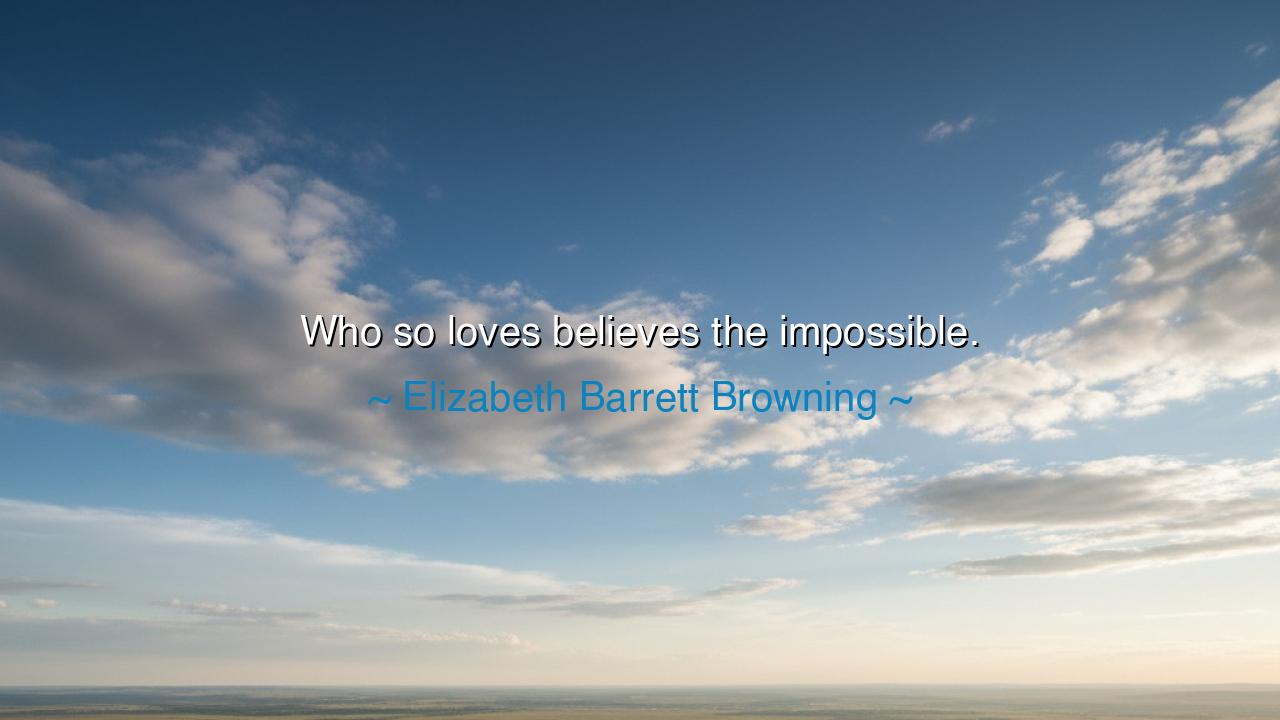
Who so loves believes the impossible.






“Who so loves believes the impossible.” — Elizabeth Barrett Browning
Thus spoke Elizabeth Barrett Browning, one of the greatest poets of the human heart, whose own life was both a triumph of spirit and a testament to love’s miraculous power. In this brief yet radiant line, she reveals the sacred alchemy of love — that it has the power to transform despair into faith, weakness into strength, and the impossible into the inevitable. For when one truly loves, one no longer measures reality by reason alone; one sees the world through the eyes of the heart, where limits dissolve and hope reigns supreme. To love is to believe — to trust in what cannot yet be seen, to hold fast to what others deem unreachable.
Browning wrote in an age when love was often constrained by society, duty, and fear. Yet she herself lived the very truth of her words. She, a fragile and reclusive poet, long thought imprisoned by illness and family control, found through love the strength to defy the impossible. When she met Robert Browning, her fellow poet, their letters — filled with tenderness, courage, and devotion — became the bridge between two souls. Against her father’s will, against her frail health, against the judgment of the world, she chose love and fled with him to Italy. Her love gave her wings where once she could not even stand. In that act, she proved her own creed: those who love believe the impossible, and by believing, they make it so.
The ancients, too, understood this mystery. Love, they said, is the force that moves both heaven and earth. The philosopher Plato called it the divine madness — a fire that drives mortals to seek the eternal. And in this holy madness lies the power to believe beyond reason. When Orpheus descended into the underworld to reclaim Eurydice, he defied death itself, trusting that love could pierce the darkness. When Dante journeyed through the inferno for Beatrice, he carried love as his torch through realms no mortal had endured. Such is love’s faith — that it dares to look upon the impossible not with fear, but with wonder.
To love deeply is to touch the realm of the infinite. When one’s heart is aflame with love, the world no longer appears fixed or final. Obstacles shrink, boundaries fade, and the spirit becomes fearless. Love believes where logic despairs. The mother who sits by her child’s bedside through a long night believes in healing even when doctors have lost hope. The lover who waits through years of distance believes that reunion will come. The artist who loves his vision believes it will find its form, though the world doubts him. Love gives the heart its second sight — the ability to see what is not yet visible, to feel what is not yet born.
In Browning’s own work, this belief burns like an eternal flame. Her poems are filled with the conviction that love is the one force that connects earth to heaven. She saw that love is not naive — it is brave. To love is to risk heartbreak, rejection, even loss; yet to withhold love is to deny life itself. The one who loves, therefore, becomes heroic, for they choose faith over fear, surrender over safety. Love is not blind — it is visionary. It sees farther, deeper, and truer than the mind can ever reason.
History, too, bears witness to those who loved and thus achieved the impossible. Think of Mahatma Gandhi, who loved his people and believed that truth and nonviolence could defeat an empire. Or Martin Luther King Jr., who believed that love could overcome hate, and justice could rise from the ashes of oppression. Their love was not sentimental, but courageous — the love that believes, the love that acts. For to love truly is to believe that the world can be remade through compassion.
So, my child of light, remember this teaching: when you love, do not measure your faith by what is likely, but by what is right. Believe in goodness, even when the world mocks it. Believe in forgiveness, even when bitterness seems stronger. Believe in the miracle of connection, even when loneliness surrounds you. Let love enlarge your heart until it can hold both sorrow and joy, both loss and hope.
For Elizabeth Barrett Browning spoke not of love as comfort, but as courage — the force that makes the human spirit divine. When you love, believe the impossible, and act upon that belief. For it is by such love that miracles are born, and by such faith that the impossible bends to the will of the heart.






AAdministratorAdministrator
Welcome, honored guests. Please leave a comment, we will respond soon